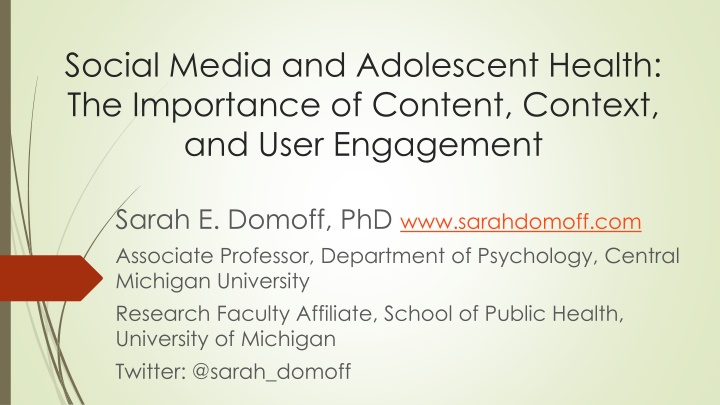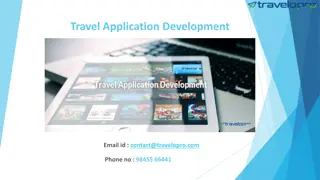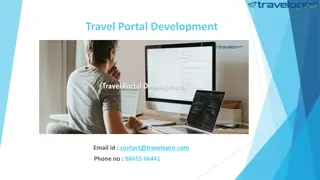
Understanding Adolescent Mental Health and Social Media Impact
Explore the intricate relationship between adolescent mental health and social media usage, uncovering insights from various studies. Discover how content, context, and user engagement play crucial roles in shaping outcomes, along with practical tips for promoting healthy digital media habits among adolescents.
Uploaded on | 5 Views
Download Presentation

Please find below an Image/Link to download the presentation.
The content on the website is provided AS IS for your information and personal use only. It may not be sold, licensed, or shared on other websites without obtaining consent from the author. If you encounter any issues during the download, it is possible that the publisher has removed the file from their server.
You are allowed to download the files provided on this website for personal or commercial use, subject to the condition that they are used lawfully. All files are the property of their respective owners.
The content on the website is provided AS IS for your information and personal use only. It may not be sold, licensed, or shared on other websites without obtaining consent from the author.
E N D
Presentation Transcript
Social Media and Adolescent Health: The Importance of Content, Context, and User Engagement Sarah E. Domoff, PhD www.sarahdomoff.com Associate Professor, Department of Psychology, Central Michigan University Research Faculty Affiliate, School of Public Health, University of Michigan Twitter: @sarah_domoff
Overview 1. What does the science really tell us about adolescents, social media use, and mental health? 2. Tips for preventing social media misuse and promoting healthy digital media use.
The Science of Screens and Mental Health Several studies (e.g., Reihm et al., 2019; Shensha et al., 2018; Twenge et al., 2017; Verduyn et al., 2015) find that greater social media use is associated with: Greater internalizing symptoms Poorer subjective well-being Greater hours spent using digital media/tech (social media, going online, texting) associated with same-day increases in ADHD symptoms and behavior problems (George et al., 2017) for high-risk youth.
The Science of Screens and Mental Health Additional research suggests that the links between digital media use and adolescent mental health are not simply a function of more time on social media (or simple access; see also Coyne et al., 2020) Why do we see these associations? How may risk emerge? Content Timing/context Individual risks
The Science of Screens and Mental Health Content matters when considering social media effects Research on idealized images and aggressive content Wilksch et al. (2019)- greater time spent using image-focused social media predicted disordered eating in girls. Cyber-bullying victimization linked to depressive symptoms, suicidal ideation, aggression(Alhajji, Bass, & Dai, 2019) Same holds for positive content: youth who have positive interactions with others via social media report feeling less lonely (Magis-Weinberg et al., 2021)
The Science of Screens and Mental Health When teens use social media is a major risk factor Sleep disturbances explain the impact of Problematic social media use poorer school functioning (Vernon et al., 2015) Problematic social media use -> increased depressed mood (Vernon et al., 2016) Problematic social media use -> aggressive behaviors and delinquency (Vernon et al., 2016)
The Science of Screens and Mental Health Individual risk factors: How does a child use social media? Consider social comparison and passive scrolling (Burnell et al., 2019) What are their motivations for using social media? Relieve anxiety around Fear of Missing Out (FoMO) (Burnell et al., 2019; Reer et al., 2019). Co-morbid/pre-existing mental health concerns Depression predicts problematic social media use (Kircaburun et al., 2018) Loneliness, depression, anxiety predict greater social media engagement (mediated by FoMO and comparison; Reer et al., 2019).
Summary Social media use associated with greater mental health risks but, the relationship is nuanced. Research accounting for these national trends indicates the roles of what youth see on social media, when they are using social media, and individual risk factors.
Tips for preventing social media misuse and promoting healthy digital media use Limit setting at bedtime or use of phone features to mitigate risk Parental modeling of healthy device use during social interactions Psychoeducation and harm reduction techniques
Tips for preventing social media misuse and promoting healthy digital media use What can teens do? Enhance coping skills around negative social media interactions; seek offline support from friends and family. Communicate with friends and family about use. Identify what you enjoy about social media and be mindful of when your phone use or social media use brings more negativity (than positivity) in your life.






















